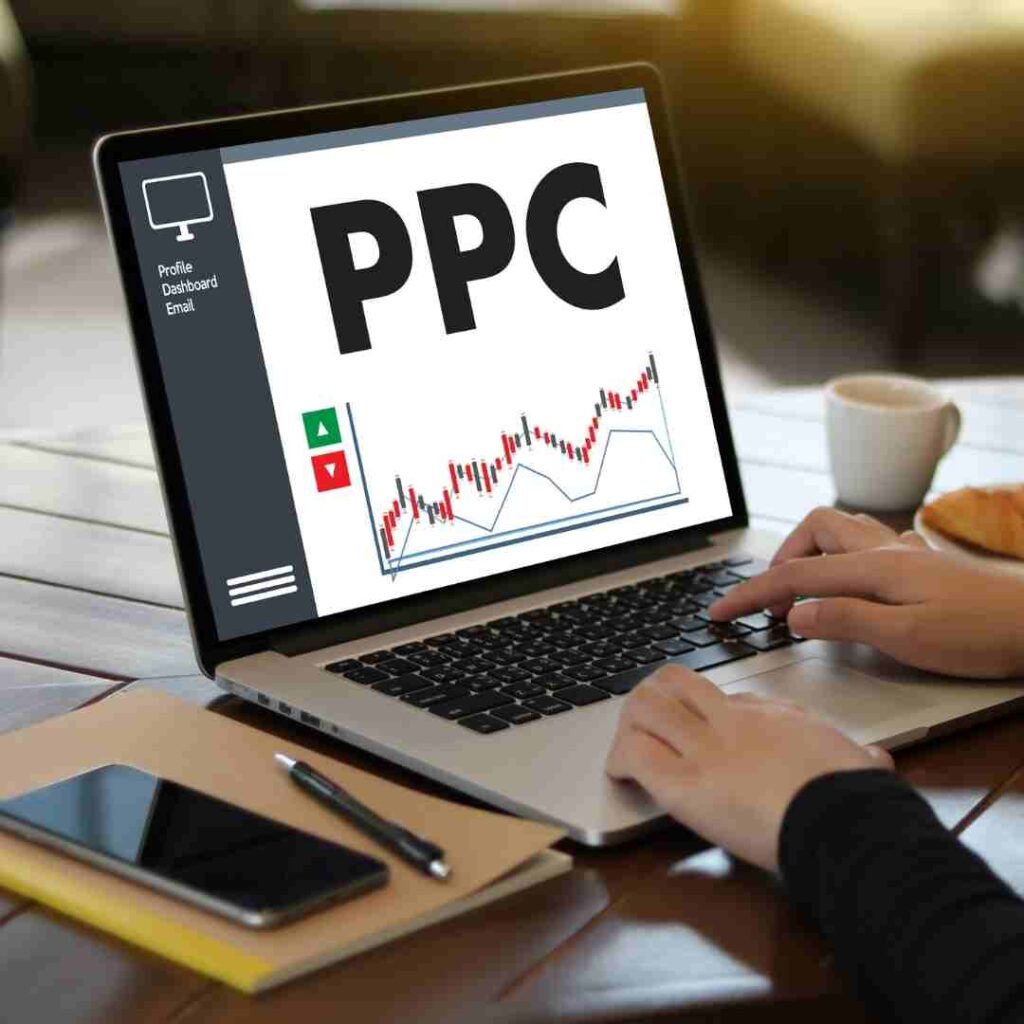In the fast-paced digital landscape, businesses are constantly seeking innovative ways to boost their online presence and drive conversions. Pay-per-click (PPC) advertising has emerged as a game-changer, allowing businesses to connect with their target audience effectively. In the vast expanse of the digital realm, where every click counts, Pay-Per-Click (PPC) advertising stands as the guiding light for businesses seeking to make their mark. Picture this: a magical landscape where your brand sparkles like a star, captivating the attention of potential customers with each click. This is the realm of PPC advertising – an enchanting journey that transcends the mundane and propels your business into the spotlight. In this blog, we delve into the world of PPC advertising, exploring its nuances, benefits, and strategies that can propel your business to new heights.

Understanding the Essence of PPC Advertising
PPC advertising is more than just a marketing tool; it’s a dynamic method of reaching potential customers at the right moment. Pay-per-click means exactly that – advertisers pay a fee each time their ad is clicked. This model ensures that your investment directly correlates with user engagement. PPC, or Pay-Per-Click, advertising is a digital marketing strategy where advertisers pay a fee each time their ad is clicked. It operates on a bidding system, with advertisers selecting keywords relevant to their business. When users search using these keywords, an ad auction takes place, considering factors like bid amount and ad quality. The highest bidder’s ad is displayed prominently. Advertisers only pay when users click on their ad, directing them to the business’s website. This model offers targeted advertising, control over budgets, and real-time performance tracking, making it a dynamic and effective way to drive online traffic.

DOES PPC WORK?
According to a study in 2022, companies spent $164.6 billion on search advertising globally. This figure is expected to rise to almost 190.5 billion US dollars by the end of 2024.
1- PPC advertisements in search results account for nearly half of all page clicks.
2- 75% of consumers think adverts help them find what they’re looking for.
3- visits that come to your site through a PPC ad are 50% more likely to buy than organic visits.
4- PPC search advertisements may enhance brand recognition by up to 80%.

When PPC Advertising Is Most Effective?
As businesses navigate the complex realm of online advertising, understanding the optimal moments to deploy PPC campaigns becomes paramount.

1. Launching a New Product or Service:
When introducing a new product or service to the market, the race for visibility is intense. Leveraging PPC advertising at this juncture ensures that you’re offering swiftly captures the attention of your target audience. Craft compelling ad copy that highlights the unique features and benefits, and use strategic keywords to align with early search queries.
2. Seasonal Promotions and Events:
Harness the power of PPC advertising is during seasonal peaks and special events. Whether it’s Black Friday, Valentine’s Day, or a customized sales event, tailored PPC campaigns can skyrocket your visibility. Ensure your ad content resonates with the festive spirit and integrates seasonal keywords to capitalize on heightened consumer interest.
3. Geo-Targeted Marketing Initiatives:
For businesses catering to specific geographical regions, geo-targeted PPC campaigns are a game-changer. Tailor your ads to resonate with the local audience, incorporate location-specific keywords, and utilize ad extensions to provide relevant business information. This ensures your business appears prominently for users in the targeted locations.
4. Recovering Abandoned Carts:
Cart abandonment is a common challenge in the e-commerce landscape. Deploying PPC advertising that specifically target users who abandoned their carts can be remarkably effective. Craft persuasive ad copy, offer incentives, and employ remarketing strategies to re-engage potential customers and prompt them to complete their purchases.
5. Building Brand Awareness Rapidly:
When time is of the essence, and you need to build brand awareness swiftly, PPC advertising is your ally. Craft visually appealing display ads, focus on brand messaging and employ remarketing techniques to reinforce your brand in the minds of your audience. This approach ensures your brand becomes a recognizable force in the market.
6. Testing New Market Segments:
Before committing substantial resources to a new market segment, use PPC advertising to conduct targeted experiments. Create campaigns tailored to the characteristics of the segment, analyze the response, and gather valuable insights. This data-driven approach allows for informed decision-making before scaling efforts.
7. Aligning with Social Media Campaigns:
Integrate PPC advertising with your social media marketing efforts for a comprehensive online presence. Sync ad content with your social media messaging, utilize consistent visuals and deploy socially relevant keywords. This synergy reinforces your brand message across multiple channels, enhancing overall campaign effectiveness.
10 Strategies for a Successful PPC Advertisement Campaign

1. The Emotional Impact of PPC Advertising: Connecting with Your Audience:
In the realm of digital marketing, emotions play a pivotal role in capturing the audience’s attention. Crafting ad copy that resonates emotionally can significantly boost click-through rates. Imagine the impact of a well-crafted ad that not only informs but also evokes a sense of excitement or urgency. Emotionally charged ads create a lasting impression, driving users to take the desired action.
2. Navigating the PPC Landscape: Keywords Hold the Key:
Keywords are the heartbeat of any successful PPC campaign. Thorough keyword research is essential to identify the terms and phrases your target audience is actively searching for. By strategically incorporating these keywords into your ad copy, you enhance the visibility of your ads, ensuring they appear when it matters the most. It’s not just about the words; it’s about the emotions they evoke, the desires they ignite, and the promises they make.
Imagine your business as the protagonist in a captivating story, with each keyword acting as a plot twist that keeps the audience hooked. The art lies in choosing the right keywords, those magical phrases that resonate with the souls of your potential customers, sparking a connection that transcends the screen.
3. Crafting Compelling Ad Copy: The Art of Persuasion:
In the world of PPC advertising, your ad copy is your virtual salesperson. Crafting compelling, persuasive copy is an art that involves blending creativity with a deep understanding of your audience. Use powerful words that evoke emotions, create a sense of urgency, and communicate the value proposition of your product or service.
4. Quality Score: The Foundation of PPC Success:
Google’s Quality Score is a critical element in determining the effectiveness of your PPC campaign. It considers factors like ad relevance, click-through rate, and landing page experience. A higher Quality Score not only reduces your cost per click but also ensures your ads are displayed to a more relevant audience.
5. Budgeting Wisely: Maximizing ROI in PPC Campaigns:
Setting a budget for your PPC campaign requires a delicate balance. It’s not just about spending more; it’s about spending wisely. Allocate your budget strategically across different campaigns and ad groups. Regularly monitor and adjust your budget based on the performance of each campaign to maximize your return on investment (ROI).
6. Ad Extensions: Elevating Your Ad Presence:
Enhance the visibility and appeal of your ads by utilizing ad extensions. These additional snippets of information provide users with more reasons to click on your ad. From site link extensions to callout extensions, each one adds a layer of richness to your ad, increasing the likelihood of user engagement.
7. Geo-Targeting: Precision in PPC Advertising:
Geo-targeting allows you to display your ads to a specific audience based on their location. This feature is particularly powerful for businesses with a local presence. By tailoring your ads to a specific geographical area, you ensure that your message reaches the right audience, driving higher conversion rates.
8. A/B Testing: Refining Your PPC Strategy:
Continuous improvement is the key to PPC success. A/B testing involves creating variations of your ads to determine which performs better. From headlines to images, testing different elements allows you to refine your strategy, ensuring that every aspect of your campaign is optimized for maximum impact.
9. Mobile Optimization: Capturing the Mobile Audience:
With the majority of online searches happening on mobile devices, optimizing your PPC advertising for mobile is non-negotiable. Ensure that your landing pages are mobile-friendly, and your ad copy is concise yet compelling. Mobile optimization not only improves user experience but also boosts your ad’s visibility on mobile search results.
10. The Power of Analytics: Informed Decision-Making:
To stay ahead in the competitive PPC landscape, leveraging analytics is paramount. Dive deep into performance metrics, track conversions, and analyze user behavior. Insights gleaned from analytics empower you to make informed decisions, allowing you to continually refine and optimize your PPC strategy.

Bidding Strategies Unveiled: Striking the Right Balance
The crux of a successful PPC campaign lies in adopting the right bidding strategy. Let’s explore some effective approaches to bidding that can optimize your budget while maximizing results.

1. Manual Bidding for Precision:
Manual bidding empowers advertisers with granular control over their campaigns. By setting bids at the keyword level, you can adjust bids based on performance, ensuring optimal allocation of resources. This approach is particularly effective for businesses with specific performance goals or niche markets.
2. Embracing Automated Bidding: Efficiency at Its Core:
For those seeking a more hands-off approach, automated bidding is a game-changer. Leveraging machine learning algorithms, platforms like Google Ads automate bid adjustments, optimizing for clicks, conversions, or other predefined goals. This strategy is ideal for advertisers looking to streamline their processes and leverage the power of data-driven decision-making.
3. Bid Adjustments for Targeted Campaigns:
Refine your targeting with bid adjustments. This strategy allows you to increase or decrease bids based on various factors, such as location, device, or time of day. By tailoring bids to specific criteria, you can ensure your ads are displayed to the most relevant audiences, maximizing the impact of your campaign.
Conclusion: Unleash the Potential of PPC Advertising
In conclusion, PPC advertising is not just about placing ads; it’s about creating a compelling narrative that speaks to your audience on an emotional level. From crafting persuasive ad copy to leveraging advanced features like ad extensions and geo-targeting, every element plays a crucial role in the success of your campaign. Stay vigilant, adapt to changing trends, and let the emotional resonance of your PPC ads propel your business toward unparalleled success in the digital landscape. Mastering PPC advertising requires a holistic approach encompassing compelling ad copy, strategic keyword usage, and effective bidding strategies. Whether you opt for manual precision or embrace automated efficiency, the key lies in aligning your strategy with your business goals. Stay vigilant, adapt to changing trends, and watch your PPC campaigns soar to new heights of success.
WRITTEN BY:- PALAK AGARWAL

